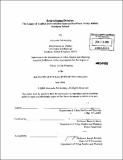| dc.contributor.advisor | Diane E. Davis. | en_US |
| dc.contributor.author | Keating, Alexander M. (Alexander Matthew) | en_US |
| dc.contributor.other | Massachusetts Institute of Technology. Dept. of Urban Studies and Planning. | en_US |
| dc.coverage.spatial | e-uk-ni | en_US |
| dc.date.accessioned | 2010-10-29T18:31:01Z | |
| dc.date.available | 2010-10-29T18:31:01Z | |
| dc.date.copyright | 2010 | en_US |
| dc.date.issued | 2010 | en_US |
| dc.identifier.uri | http://hdl.handle.net/1721.1/59752 | |
| dc.description | Thesis (M.C.P.)--Massachusetts Institute of Technology, Dept. of Urban Studies and Planning, 2010. | en_US |
| dc.description | Cataloged from PDF version of thesis. | en_US |
| dc.description | Includes bibliographical references (p. 100-104). | en_US |
| dc.description.abstract | This thesis examines the ways in which the phenomena of walling, ethnic segregation, sectarian violence, and imbalanced urban development have continued to reproduce themselves and reinforce one another in the present day, post-Good Friday city of Belfast. Situated within an understanding of the historic patterns of urban development and sectarian conflict in Belfast, as well as the city's emerging socio-spatial divergence, three case studies of present-day management and development at key 'interface' areas in North, West, and East Belfast are presented. These case studies highlight the continued legacy of violent conflict on present-day development outcomes, as well as help to frame the impact that these outcomes have on the emergence of divergent visions of desired post-conflict urban development. Ultimately, this thesis underlines why interface management, urban development, and the mitigation or escalation of violent conflict must not be addressed as separate functions within the context of chronic violence by examining how the Belfast's legacy of urban violence has conditioned the restructuring of physical space at various scales, and has itself subsequently been conditioned by those outcomes. | en_US |
| dc.description.statementofresponsibility | by Alexander M. Keating. | en_US |
| dc.format.extent | 111 p. | en_US |
| dc.language.iso | eng | en_US |
| dc.publisher | Massachusetts Institute of Technology | en_US |
| dc.rights | M.I.T. theses are protected by
copyright. They may be viewed from this source for any purpose, but
reproduction or distribution in any format is prohibited without written
permission. See provided URL for inquiries about permission. | en_US |
| dc.rights.uri | http://dspace.mit.edu/handle/1721.1/7582 | en_US |
| dc.subject | Urban Studies and Planning. | en_US |
| dc.title | Redeveloping division : the legacy of conflict and contested space in post-peace treaty Belfast, Northern Ireland | en_US |
| dc.title.alternative | Legacy of conflict and contested space in post-peace treaty Belfast, Northern Ireland | en_US |
| dc.type | Thesis | en_US |
| dc.description.degree | M.C.P. | en_US |
| dc.contributor.department | Massachusetts Institute of Technology. Department of Urban Studies and Planning | |
| dc.identifier.oclc | 670434446 | en_US |
